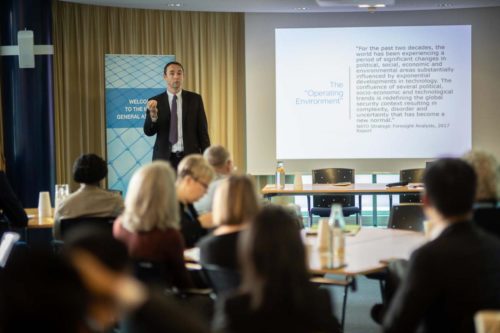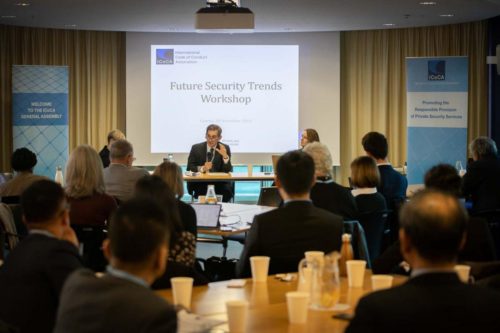FUTURE SECURITY TRENDS WORKSHOP REPORT
The Sixth Annual General Assembly was precded by a workshop on Future Security Trends, which took place on 20 November, 2019.
Setting the Scene of Possible Futures
The first of such workshops to be convened by ICoCA, Jamie Williamson, Executive Director of ICoCA opened the proceedings by presenting data projections on a range of topics and asked participants to consider what the security implications of these might be. With 75% of the world’s population projected to be living in urban environments by 2045 and the possibility of 40% of the world’s population living slums in just a decade’s time, participants were asked how security could be provided in these kinds of environments, and what the governance implications of this might be. Climate change is already causing major humanitarian disruption. By 2050 the Red Cross anticipates that 200 million people will need humanitarian aid due to climate change. So what are the security ramifications of this given that the potential for conflict and violence is greatly increased in such fragile environments. As the erosion of state security provision is balanced by the rise of non-state actors, private security providers acting in this space need to carefully consider how these trends might impact their own operations.

The Exponential Growth of Technology
Dr. Jean-Marc Rickli, Head of Global Risk and Resilience at the Geneva Centre for Security Policy (GCSP) engaged participants with a compelling and at times frightening presentation on the impact of technology on security in the coming years. Consider, for example, that computing power doubles every eighteen months, and that by 2030, 50 billion devices will be producing data at a rate never seen before. We need to prepare ourselves quickly for the disruptive changes that are coming fast down the track. Given the exponential pace of development in areas such as artificial Intelligence and robotics and the application of these technologies in the security sector, such as, for example, autonomous weapons systems, the implications are profound.
How Strategic Anticipation Can Help
Emily Munro, Deputy Head, Emerging Security Challenges Programme, Strategic Anticipation Cluster Leader, Geneva Center for Security Policy (GCSP) then considered how strategic foresight might be a useful tool for companies and governments to employ in understanding the implications of these trends for security provision. Companies that effectively utilize these tools are more capable of adapting to change and more resilient to risks that will innevitably unfold at some point down the road.
The Implications for Responsible Private Security Provision
Richard Wylde, Partner at Control Risks honed in on the security industry and the implications of these trends for the provision of responsible security that respects human rights and humanitarian law. Given the pace and scale of these trends, governments will be increasingly inclined to contract private security firms better positioned to quickly react to market and technological forces. Given this reality, a much greater level of cooperation between public and private sectors will be required to ensure high standards are achieved in security service provision.

The Implications for ICoCA
Dr. Sorcha MacLeod, Marie Skłodowska-Curie Fellow and Associate Professor, University of Copenhagen & Expert Member of UN Working Group on the Use of Mercenaries reflected that many of these trends overlap and intersect with one another. Indeed, rather than being distant dangers, they are already largely upon us. People are encountering private security actors at every level of crisis, with significant human rights issues seen at every stage. The question for ICoCA and its Members, is whether the Code of Conduct, which was formulated almost a decade ago, is fit for purpose. After careful consideration of these trends, Dr. MacLeod concluded the workshop by asking whether the International Code of Conduct needs to be updated and/or amended to ensure that it fully accounts for these new technologies and our rapidly changing world.
